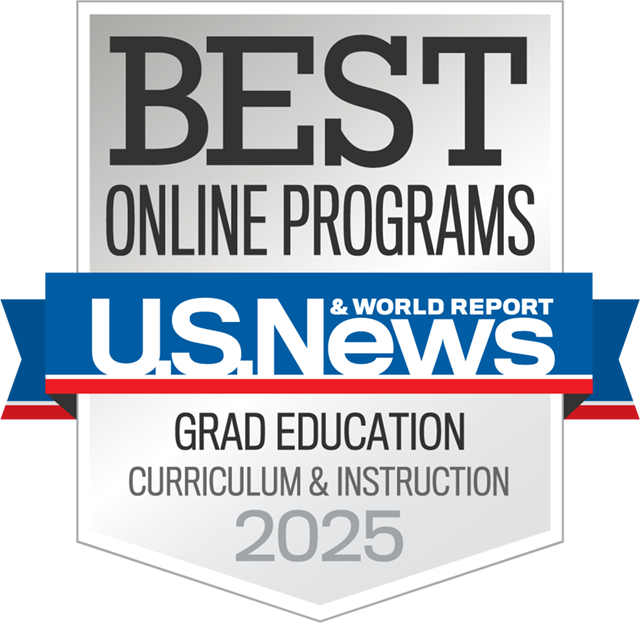100% Online
Complete your Penn State course work at your own pace and 100% online.
Application deadline
Credits and costs
Nationally Recognized

Gain the Knowledge and Practices You Need
Explore how to design, evaluate, and apply curriculum resources and provide curriculum leadership in your school and/or district.
Cultivate an inquiry stance by studying your own practice as you apply new pedagogical approaches designed to benefit learners and making responsive adjustments to curriculum, instruction, and/or assessment.
Enhance your understanding of the challenges facing education today and the significant role of education in schools and society.
Gain a deeper understanding of how to equitably support learners' sense-making within and across content areas.
Learn how to bridge research and practice through independent research mentored by top faculty in the field.
Course Work That’s Personalized and Applicable to Your Career
Course Work That’s Personalized and Applicable to Your Career
Your master’s degree curriculum will be personalized to reflect your professional goals and personal interests. Whether you seek depth in a single area or choose an interdisciplinary approach, your faculty adviser will help you create a truly customized plan of study with course work that makes sense for you. You will have the flexibility to choose from courses in a variety of disciplines, including children’s literature, curriculum and supervision, elementary education, English language arts, multilingual education, social studies, and STEM education.
The Master of Education (M.Ed.) in Curriculum and Instruction is a 30-credit degree. All courses are three credits. All courses in the program are at the graduate level (400, 500, 800). A culminating inquiry project (paper, portfolio, children’s book, etc.) is required for successful completion of the degree. You will negotiate the project’s focus, scope, and methods with your faculty adviser and be mentored throughout the process.
There is a Children’s Literature path for students wanting to specialize in literature for children and adolescents. This path has a specialized research core course, LLED 568: Doing Research in Children’s Literature, and requires LLED 502: Studies in Literature for Children as one of the personalized course work selections.
While the course work is asynchronous and the curriculum is personalized, learning happens in a community with your instructors and peers. Much of the course work is completed in collaboration with others (e.g. discussion boards, group projects).
This master’s program is not a cohort model. Typically, students take two to three years to complete the degree; however, this timeline can vary based on the commitments and demands of personal and professional lives.
Please note that this master's degree program is not designed to lead to initial teacher certification in any state.
The program is structured around these requirements. Each course is 3 credits:
Core Course Work
3-credit core colloquium (first course)
9 credits of core courses — learning, curriculum, research
Personalized Course Work
15 credits with a personalized focus
3 credits of an additional approved elective
Core Course Work (12 credits)
- 3credits
Introduction to colleagues and program with attention to themes of inquiry, evidence, and assessment. (C I 590 should be the first course in a student's program.)
- 3credits
Current school programs and options and their impact on pupils; problems in introducing new content into the curriculum.
- or:3credits
The analysis and use of the foundations which underlie models of curriculum design.
- 3credits
The study of childhood from cultural, historical, psychological, and philosophical perspectives.
- or:3credits
Exploration of the theoretical and empirical foundations of the teaching and learning of science.
- Note
Students on the Children’s Literature path do not have the option to select this as a Core Course.
- or:3credits
This course covers the major theories used to explain learning across educational settings.
- 3credits
Course guides teachers to develop systematic inquires into effective teaching and learning. CI 501 should be taken the third to last semester before graduation.
- Note
CI 501 should be taken the third to last semester before graduation
- or:3credits
Addresses the different research approaches for doing research in children's literature. Specifically, it discusses research methods and topics in a wide range of theoretical and practical fields — including psychoanalysis, literacies, genre studies, critical pedagogies, biographical studies, critical race theory, and reader responses — guiding learners on how to conduct original research around any topic of choice. It also addresses research methods for doing research on creative writing.
- Note
Students in the Children's Literature path will take this core course instead of CI 501
- Timing
This course should be taken near the end of your program, but not as your last course
Personalized Course Work (18 credits)
Personalize your course work by focusing in one disciplinary area or select across multiple areas.
Course Selections (select 12 credits)
- 3credits
An in-depth study of picturebooks as art objects providing aesthetic experiences and contributing to our aesthetic development in literacy education.
- 3credits
A study of nonfiction literature for children and adolescents with an emphasis on inspiring curiosity and agency.
- 3credits
Examine work by writers of classic fantasies (H. C. Andersen, A. A. Milne, etc.) written for children, as well as the work of some contemporary authors (J. K. Rowling, Philip Pullman, Tomi Adeyemi, Nnedi Okorafor, etc.) and popular comics. We will also look at the role of the imagination in the lives of children and the important ways children may transform their private spaces into spaces of wonder that allow them to flourish and reimagine their possibilities.
- 3credits
Critical study of adolescent literature, its diversity of cultural voices, and designs for its use in secondary school classrooms.
- 3credits
Read, discuss, analyze, and reflect on diverse literature from multicultural and critical multicultural perspectives to demonstrate how such ways of readings not only expand literacies but center issues of social justice.
- 3credits
An in-depth study of myths and folktales shared with children and how these stories are remade across different modes and disseminated today across multiple communities of practices.
- 3credits
Supervised workshop in the craft and techniques of writing picture books, short stories, longer fiction, and nonfiction literature for children.
- 3credits
Managing and coping with disruptive student behavior in instructional settings so that they support the teaching/learning process.
- 3credits
This course focuses on practice-embedded curriculum inquiry and surveys an array of approaches and methods that are quantitative, qualitative, or both.
- 3credits
The analysis and use of the foundations which underlie models of curriculum design.
- 3credits
Social and institutional settings for instructional supervision; functions, activities, and practices of supervision; supervisory case studies.
- 3credits
Strategies and techniques for supervision/coaching of instruction intended to enhance teacher reflection, self-direction, and autonomy.
- 3credits
Designing, implementing, and evaluating effective staff development programs for personnel in educational settings.
- 3credits
Managing and coping with disruptive student behavior in instructional settings so that they support the teaching/learning process.
- 3credits
Critical understanding of basic concepts and principles in second language acquisition and teaching. Teaching of world languages, including English as a second language.
- 3credits
Develop abilities in planning, conducting, and interpreting mathematics interviews to gain an understanding of students' thinking processes and current knowledge.
- or:3credits
This course develops understandings of research and practices around issues in PreK–12 Science, Technology, Engineering, and Mathematics (STEM) education.
- or:3credits
This course develops understandings of research and practices around issues in PreK–12 Science, Technology, Engineering, and Mathematics (STEM) education.
- 3credits
A study of nonfiction literature for children and adolescents with an emphasis on inspiring curiosity and agency.
- 3credits
Read, discuss, analyze, and reflect on diverse literature from multicultural and critical multicultural perspectives to demonstrate how such ways of readings not only expand literacies but center issues of social justice.
- 3credits
A study of nonfiction literature for children and adolescents with an emphasis on inspiring curiosity and agency.
- 3credits
In depth examination of writing development and the development of writing components of language arts programs K–12.
- 3credits
Critical study of adolescent literature, its diversity of cultural voices, and designs for its use in secondary school classrooms.
- 3credits
Read, discuss, analyze, and reflect on diverse literature from multicultural and critical multicultural perspectives to demonstrate how such ways of readings not only expand literacies but center issues of social justice.
- 3credits
Theories of media literacy, issues of non-print technology in language and literacy.
- 3credits
Critical understanding of basic concepts and principles in second language acquisition and teaching. Teaching of world languages, including English as a second language.
- 3credits
This course develops understandings of research and practices around issues in PreK–12 Science, Technology, Engineering, and Mathematics (STEM) education.
- or:3credits
This course develops understandings of research and practices around issues in PreK–12 Science, Technology, Engineering, and Mathematics (STEM) education.
- 3credits
Develop abilities in planning, conducting, and interpreting mathematics interviews to gain an understanding of students' thinking processes and current knowledge.
- 3credits
Survey of the status of knowledge about mathematics learning and instruction, K–12; analysis of research procedures; instruments for evaluating research.
- 3credits
This course is intended to help experienced educators to critically understand the "E" in "STEM education.
Course Availability
If you're ready to see when your courses will be offered, visit our public LionPATH course search (opens in new window) to start planning ahead.
Advance Your Career

Advance Your Career
You can use the knowledge gained from this program and the support of Penn State career resources to pursue careers in a variety of fields, depending on your goals.
Job Titles Related to This Degree
The following roles are often held by people with this type of degree:
- Curriculum and Instruction Director
- Curriculum Coordinator
- Curriculum Director
- Educator
- Teacher
Employment Outlook for Occupational Fields Related to This Degree
Estimates of employment growth and total employment are provided by the U.S. Bureau of Labor Statistics and are subject to change. While these occupations are often pursued by graduates with this degree, individual outcomes may vary depending on a variety of factors. Penn State World Campus cannot guarantee employment in a given occupation.
Secondary School Teachers, Except Special and Career/Technical Education
Elementary School Teachers, Except Special Education
Instructional Coordinators
Middle School Teachers, Except Special and Career/Technical Education
Career Services to Set You Up for Success

From the day you're accepted as a student, you can access resources and tools provided by Penn State World Campus Career Services to further your career. These resources are beneficial whether you're searching for a job or advancing in an established career.
- Opportunities to connect with employers
- Career counselor/coach support
- Occupation and salary information
- Internships
- Graduate school resources
On-Demand Webinar
Our on-demand Master of Education in Curriculum and Instruction Webinar can provide you additional insight into the curriculum if you are unable to attend our upcoming events.
Ready to Learn More?
Get the resources you need to make informed decisions about your education. Request information on this program and other programs of interest by completing this form.
Ready to take the next step toward your Penn State master's degree?
Costs and Financial Aid
Costs and Financial Aid
Learn about this program's tuition, fees, scholarship opportunities, grants, payment options, and military benefits.
Costs and Financial Aid
Graduate Tuition
Graduate tuition is calculated based on the number of credits for which you register. Tuition is due shortly after each semester begins and rates are assessed every semester of enrollment.
2024–25 Academic Year Rates
| How many credits do you plan to take per semester? | Cost |
|---|---|
| 11 or fewer | $1,027 per credit |
| 12 or more | $12,325 per semester |
2025–26 Academic Year Rates
| How many credits do you plan to take per semester? | Cost |
|---|---|
| 11 or fewer | $1,037 per credit |
| 12 or more | $12,448 per semester |
Financial Aid and Military Benefits
Some students may qualify for financial aid. Take the time to research financial aid, scholarships, and payment options as you prepare to apply. Federal financial aid may only be used to pay for credits used to satisfy program requirements.
Military service members, veterans, and their spouses or dependents should explore these potential military education benefits and financial aid opportunities, as well.
Additional Cost of Attendance Details
To view the detailed list of cost of attendance elements:
- visit the Tuition Information site
- click the plus sign to expand the table
- select a semester from the World Campus row
Technical Requirements
Review the technical requirements for this program.
Designed for Educators
Designed for Educators
The Master of Education in Curriculum and Instruction is designed for teachers as well as a wide range of education professionals, including curriculum specialists, paraprofessionals, librarians, out-of-school educators, and more. It provides professional learning opportunities that are informed by the latest research and can be immediately applicable in your current role.
Please note that this is a master's degree program. It is not designed to lead to initial teacher certification in any state. However, it may help you renew or maintain your existing certification if you are already a certified teacher. Please check with your state's Department of Education for renewal and maintenance requirements.
Earn a Valuable Credential along the Way

Earn a Valuable Credential along the Way
Show mastery of specific subjects before your degree is complete. Thanks to shared courses across programs, students can often earn a certificate along with their degree in less time than if they earned them separately.
Certificate Programs Related to This Degree
The following certificate can be earned while completing this degree program:
Explore classic and contemporary works of children’s literature as you learn about imagination and its role in the lives of children. This online program is ideal for educators and librarians, as well as aspiring children's writers and illustrators yearning to refine their craft.
Learn more about the Graduate Certificate in Children's LiteratureOur online courses typically follow a 12- to 15-week semester cycle, and there are three semesters per year (spring, summer, and fall). If you plan to take a heavy course load, you should expect your course work to be your primary focus and discuss your schedule with your academic adviser.
To Finish Your Degree in One to Two Years
- Take 3–4 courses each semester
To Finish Your Degree in Two to Three Years
- Take 2–3 courses each semester
To Finish Your Degree in Three to Four Years
- Take 1 course each semester
Timelines may vary based on course availability.
Convenient Online Format
This program's convenient online format gives you the flexibility you need to study around your busy schedule. You can skip the lengthy commute without sacrificing the quality of your education and prepare yourself for more rewarding career opportunities without leaving your home.
A Trusted Leader in Online Education

Penn State has a history of more than 100 years of distance education, and World Campus has been a leader in online learning for more than two decades. Our online learning environment offers the same quality education that our students experience on campus.
Professional Licensure / Certification
Disclosures
Many U.S. states and territories require professional licensure/certification to be employed. If you plan to pursue employment in a licensed profession after completing this program, please visit the Professional Licensure/Certification Disclosures by State interactive map for more information.
Please note that this master's degree program is not designed to lead to initial teacher certification in any state; however, it may help you renew or maintain your existing certification if you are already a certified teacher. Please check with your state's Department of Education for initial licensure requirements and renewal and maintenance requirements.
How to Apply to Penn State

How to Apply to Penn State
Apply by October 1 to start January 12
Application Instructions
Deadlines and Important Dates
Complete your application and submit all required materials by the appropriate deadline. Your deadline will depend on the semester you plan to start your courses.
Spring Deadline
Apply by October 1 to start January 12Summer Deadline
Apply by April 1, 2026, to start May 18, 2026
Steps to Apply
For admission to the J. Jeffrey and Ann Marie Fox Graduate School, an applicant must hold either (1) a baccalaureate degree from a regionally accredited U.S. institution or (2) a tertiary (postsecondary) degree that is deemed comparable to a four-year bachelor's degree from a regionally accredited U.S. institution. This degree must be from an officially recognized degree-granting institution in the country in which it operates.
GPA — All applicants are expected to have earned a junior/senior grade point average of 3.0 or higher.
You will need to upload the following items as part of your application:
Official transcripts from each institution attended, regardless of the number of credits or semesters completed. Transcripts not in English must be accompanied by a certified translation. If you are a Penn State alum, you do not need to request transcripts for credits earned at Penn State but must list Penn State as part of your academic history.
Test Scores — No GRE/GMAT scores are required.
English Proficiency — The language of instruction at Penn State is English. With some exceptions, international applicants must take and submit scores for the Test of English as a Foreign Language (TOEFL) or International English Language Testing System (IELTS). Minimum test scores and exceptions are found in the English Proficiency section on the Fox Graduate School's "Requirements for Graduate Admission" page. Visit the TOEFL website for testing information. Penn State's institutional code is 2660.
References (2) — You will need to initiate the process through the online application by entering names, email addresses, and mailing addresses of two references. Upon submission of your application, an email will be sent to each reference requesting they complete a brief online recommendation regarding your commitment for success in an online program. Please inform all recommenders they must submit the form in order for your application to be complete.
Program-Specific Questions/Materials
Résumé — Upload to the online application.
Statement of Purpose — Please tell us why you would like to pursue graduate studies at Penn State. You may wish to tell us about questions or issues that drive you, experiences that have shaped your professional interests, your medium-term and long-term goals, and why you think that Penn State is well-suited to help you. Feel free to include any additional information that may assist faculty in evaluating your preparation and aptitude for graduate study at Penn State.
Writing Sample — Please attach a critical review of a research article or report from a recent educational journal in your area of proposed study. Identify the problem or issue, the author's analytical/empirical approach, and the nature of the evidence used in supporting any conclusions. Also, please offer your individual perspective on the importance of the research problem, the nature of the inquiry, and the legitimacy of the conclusions. At the top of the review, include a citation with the author's name, article title, journal name, volume, page numbers, and publication date. We’re looking for an essay of approximately 1000 words.
To begin the online application, you will need a Penn State account.
Create a New Penn State Account
If you have any problems during this process, contact an admissions counselor at [email protected].
Please note: Former Penn State students may not need to complete the admissions application or create a new Penn State account. Please visit our Returning Students page for instructions.
You can begin your online application at any time. Your progress within the online application system will be saved as you go, allowing you to return at any point as you gather additional information and required materials.
- Choose Enrollment Type: "Degree Admission"
- Choose "WORLD CAMPUS" as the campus
Checking Your Status
You can check the status of your application by using the same login information established for the online application form.Applying As a Nondegree Graduate Student
Apply as a "nondegree" graduate student to begin taking courses right away. If you are taking courses as a nondegree graduate student, you must apply to the master's degree in your first semester of study to be considered for admission into the Curriculum and Instruction Master of Education. Penn State limits the number of nondegree credits that can be transferred into degree programs, even when those credits are earned at Penn State. Also, if you are admitted, you’ll be assigned a faculty adviser who will help ensure that you take the most appropriate courses for your specific interests and goals. In the graduate school application:
- Select "Nondegree Admission"
- Choose "WORLD CAMPUS" as the campus
5. Complete the application.
Admissions Help
If you have questions about the admissions process, contact an admissions counselor at [email protected].
Contact Us

Contact Us
Have questions or want more information? We're happy to talk.
To learn more about the Master of Education in Curriculum and Instruction, please contact:
World Campus Admissions Counselors
Phone: 814-863-5386
[email protected]
Kayla McCloskey
Department of Curriculum and Instruction
The Pennsylvania State University
170 Chambers Building
University Park, PA 16802
Phone: 814-865-2430
[email protected]
Learn from the Best
Learn from the Best
Offered by the Penn State College of Education, the curriculum and instruction master’s degree program is renowned for preparing and supporting education professionals. The online program delivered through Penn State World Campus is taught by the same nationally recognized faculty who teach our rigorous, high-quality residential program.
Faculty
Jason Griffith
- DegreePh.D., English Education, Arizona State University
- DegreeM.A., Contemplative Education, Naropa University
- DegreeB.S., English Education, Indiana University of Pennsylvania
Dr. Jason Griffith is an assistant professor of literacies and English language arts. A former middle and high school English teacher, his research interests include adolescent and children’s literature, narrative nonfiction and storytelling, in-service and pre-service teacher preparation, the teaching of writing, and media literacy.
Mari Haneda
- DegreePh.D., Second Language Education, Curriculum and Instruction, OISE/University of Toronto
- DegreeM.A., English, Kyoto University, Japan
- DegreeM.Ed., Curriculum and Instruction, OISE/University of Toronto
Dr. Mari Haneda is an associate professor of world languages education and applied linguistics at Penn State. Drawing on qualitative research and discourse analytic methods, her scholarship has focused on the education of K–12 emergent bilingual students, L2 literacy development, language and identity, ESL teachers' practices, and teacher education. She teaches qualitative and micro-ethnographic research methods courses and courses related to L2 learning and literacy development.
Elisa Hopkins
- DegreePh.D., Curriculum and Instruction, Penn State
- DegreeM.A., English, Florida State University
- DegreeB.A., English, College of William and Mary
Dr. Elisa Hopkins is an associate teaching professor of education specializing in literature for children and adolescents. She is lead faculty for the Penn State World Campus children's literature program. Her research interests include multicultural poetry, the development of critical consciousness, fairy-tale studies, and nonfiction literature for children and adolescents.
Charlotte L. Land
- DegreePh.D., Curriculum & Instruction, The University of Texas at Austin
- DegreeM.Ed., Literacy Education, The University of Missouri
- DegreeB.S., Secondary English Education, The University of Missouri
Dr. Charlotte L. Land is an assistant professor in curriculum and instruction at Penn State University Park. Her teaching and research are situated within literacy education and teacher education. She focuses primarily on writing and writing instruction, critical and humanizing pedagogies, and inquiry and teacher learning. Across her work, Dr. Land aims to reframe both learners and teachers as "transformative intellectuals" (Giroux, 1985) who are capable and willing to make important decisions about their work and contribute to what we know about reading, writing, teaching, and learning.
Andrea McCloskey
- DegreePh.D., Curriculum and Instruction (Mathematics Education), Indiana University-Bloomington
- DegreeM.A.T., Secondary Mathematics Teaching, Miami University
- DegreeB.S., Mathematics, Wheaton College (IL)
Andrea McCloskey is an associate professor of mathematics education in the Department of Curriculum and Instruction. Her research focuses on teacher preparation and development, cultural and political influences on teaching practices in elementary school mathematics, and ways that improvisational theater can critique current practices and point to new ways of understanding mathematical activity in classroom settings. She is also the co-founder and an owner of Happy Valley Improv, a long-form improvisational theater company.
Scott McDonald
- DegreePh.D., Learning Technologies in Science Education, University of Michigan
- DegreeM.S., Science Education, University of Michigan
- DegreeM.A.T., Physics, University of Michigan
- DegreeB.S., Physics, Colorado College
Dr. Scott McDonald is Professor of Science Education and Director of the Krause Studios for Innovation. Prior to earning his doctorate, he was a high school physics, math, and environmental science teacher. His research focuses on teaching and learning of science, in particular how teachers learn ambitious and equitable pedagogies. He also has projects focused on students using data representations and visualizations to develop understandings of complex systems phenomena, including Plate Tectonics, Hurricanes, and Wildfires. He teaches SCIED 552 and SCIED/MTHED 460 in the STEM emphasis area of the M.Ed.
Scott Metzger
- DegreePh.D., Curriculum, Teaching, and Educational Policy, Michigan State University
- DegreeM.A., Curriculum and Teaching, Michigan State University
- DegreeB.A., History, Michigan State University
Dr. Scott Metzger is Associate Professor of Social Studies Education and lead faculty for 7-12 social studies teacher certification at Penn State. He was a high-school social studies teacher in Michigan for six years before earning his doctorate. His scholarship focuses on history teaching, learning, and curriculum; how individuals, societies, and media use the past; and difficult historical and social topics. Dr. Metzger teaches courses on social studies educational research and on history education in the Social Studies Education emphasis area of the M.Ed.
Ashley N. Patterson
- DegreePh.D., Multicultural and Equity Studies in Education, Ohio State University
- DegreeM.A., Quantitative Evaluation, Research and Measurement, Ohio State University
- DegreeM.S., Reading Specialization, Hood College
- DegreeB.S., Special and Elementary Education, Boston University
Dr. Ashley N. Patterson's work in the educational field began as an elementary-level inclusive special educator. She is committed to preparing educators who take up a critical lens to working with children and best serving their individual needs. Broadly, Dr. Patterson's research interests focus on intersections between identity and education, considering the dialogic relationship that exists as the ways we think about ourselves impact our educational experiences while our educational experiences impact the ways we think about ourselves.
Julia Plummer
- DegreePh.D., Astronomy & Education, University of Michigan
- DegreeM.S., Astronomy, University of Michigan
- DegreeB.S., Physics, Washington State University
Dr. Julia Plummer spent more than a decade teaching children and adults in planetariums and other informal settings and continues to teach introductory astronomy and science methods for elementary teachers. Her research focuses on the design of learning environments that support children's spatial thinking and science practices, primarily in the domain of astronomy. She also investigates how storybook narratives can be used to support science learning. Her research includes both formal environments, such as classrooms and informal environments, such as planetariums and museums.
Jeanine Staples-Dixon
- DegreeEd.D., Reading/Writing/Literacy, The University of Pennsylvania
- DegreeEd.M., Teaching and Curriculum, Harvard University
- DegreeB.A., English Literature, Howard University
- DegreeCertificate in English Education (9–12), Harvard University
- DegreeCertificate in Urban Studies, The University of Pennsylvania
Dr. Jeanine Staples-Dixon is a professor of literacy and language. She also serves as senior faculty mentor for the University through the Office of Educational Equity. A long-time leader in Critical New Literacies Studies and teacher education, she's currently writing her two forthcoming books, Extraordinary Pedagogies: An Endarkened Feminist Approach To Revolutionizing Teacher Consciousness (Teachers College Press, 2024) and Extraordinary Literacies: Regarding the Literate Lives of Black Girls and Women In Schools & Society (Palgrave MacMillan, 2026). She teaches LLED 580, CI 590, and CI 501.
Dana Stuchul
- DegreePh.D., Educational Theory and Policy, Penn State
- DegreeM.Ed., Curriculum and Instruction, Miami University
- DegreeB.S. Ed, Chemistry and Environmental Science Education, Miami University
Dr. Dana Stuchul's teaching and research interests include classroom and community contexts (and the creation of these contexts) that enable people to contribute to their own and to the world's healing. Specifically, by inquiring into the myriad of relationships of which we are a part (of human beings to each other, to themselves, to the natural world, to the more-than-human realms, and more), Dr. Stuchul’s scholarship seeks ways that we can learn to live together more sanely, more justly, more compassionately and more sustainably.
Anne Elrod Whitney
DegreePh.D., Education, University of California, Santa BarbaraDr. Anne Whitney is a professor at Penn State focusing on writing, the teaching of writing, and professional development. Her research addresses how writing fits into lives — crossing disciplinary boundaries of composition studies, professional development, teacher education, and English language arts education.
Read more about Dr. Anne Whitney at her website or by visiting the College of Education directory.
Rachel Wolkenhauer
- DegreePh.D., Curriculum and Instruction, University of Florida
- DegreeM.Ed., Curriculum and Instruction, University of Florida
- DegreeB.A., Elementary Education, University of South Florida
Dr. Rachel Wolkenhauer is an assistant professor of education in curriculum and supervision. Focusing on practitioner inquiry, she studies and supports professional learning for teachers through school-university partnerships. Dr. Wolkenhauer investigates the development of inquiry stance and teacher leadership, job-embedded professional development, and practice-based and theoretical issues in schools.
Xiangquan Yao
- DegreePh.D., Mathematics Education, Ohio State University
- DegreeM.A., Curriculum and Pedagogy, Beijing Normal University
- DegreeB.A., Education, Central China Normal University
Dr. Xiangquan Yao is an assistant professor in mathematics education at Penn State. His research focuses on the nature of mathematics thinking with technology and mathematics understandings for teaching with technology. Dr. Yao advises in the STEM education emphasis area of the M.Ed.
Carla Zembal-Saul
- DegreePh.D., Science Education, University of Michigan
- DegreeM.Ed., Science Education, University of Houston
- DegreeB.S., Secondary Science Education, University of Michigan (Certification: Biology 7–12)
Dr. Carla Zembal-Saul teaches science methods and specialized science content courses for elementary teachers. Her graduate-level teaching aligns with her research interests, which focus on teacher learning and development related to engaging students in scientific discourse and practices.
News




